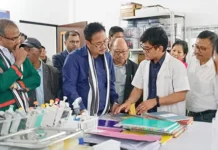ITANAGAR, 9 May: Governor KT Parnaik said that the Waqf Amendment Bill, 2025 is a progressive step forward and is designed to ensure that the benefits and revenues from Waqf properties are directed towards the upliftment of those in need, helping them to stand on par with other communities.
He said this during a ‘Waqf reform awareness meet’at the Raj Bhavan here on Friday. The meeting brought together community leaders, scholars, and representatives from various faiths to discuss the significance of the recently passed Waqf Amendment Bill.
Interacting with the participants, the governor emphasised that “the bill results from extensive consultations, thoughtful deliberations, and collective effort to bring meaningful reforms to benefit all sections of the Muslim community.”
The governor appealed to the Muslim community not to have the feeling that they are a minority community. Citing inspiring examples of prominent Muslim figures who have made invaluable contributions to India, including the late president Dr APJ Abdul Kalam, he said that “the community has been contributing richly to the growth and progress of the society and the country.”
The governor, while acknowledging the participation of members of all faiths in the meet, said that “in Arunachal Pradesh, the people of the state have the highest regard for all religions and respect them.”
He appealed to the people to continue fostering “goodwill and positive thought” for the progress of the society, the state, and the nation.
Indigenous Affairs Minister Mama Natung described the Waqf Amendment Bill as a corrective and inclusive step, and encouraged all citizens to understand the positive impact of the bill and work together to strengthen communal harmony.
Prof Nani Bath and Prof Nabum Naka Hina from the political science department of RGU, along with DNGC Principal Dr MQ Khan, provided insightful presentations on the history of Waqf, the key amendments introduced in the bill, and the long-term benefits for the community.
Dharm gurus and representatives from various faiths, including indigenous, Hindu, Muslim, Sikh, and Christian communities, as well as members of civil society, attended the meet. (Raj Bhavan)


